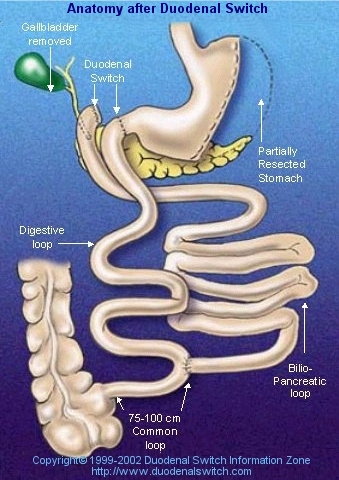Duodenal Switch (DS): When It's Time to Consider Bariatric Plan B

Duodenal switch surgery is a combination of a gastric sleeve and gastric bypass surgery, in simple terms. It decreases both the quantity of food that can be accommodated by the stomach and the number of calories that can be absorbed and used by the body.
It is considered one of the more specialized weight loss surgery procedures and is only performed by bariatric surgeons who have successfully undergone procedure-specific training to perform it.
WHO IS APPROPRIATE FOR DUODENAL SWITCH SURGERY?
Duodenal switch revisional bariatric surgery is sometimes performed as a secondary procedure after a gastric band or sleeve gastrectomy surgery did not achieve the desired overall weight loss the patient hoped to achieve.
This lesser know procedure actually offers the patient the highest opportunity to lose the highest volume of weight loss.
DUODENAL SWITCH KEY FACTS:
*It may reduce hunger significantly.
*You may have nutritional deficiencies and must take multi-vitamins daily
*You will not experience dumping syndrome if you consume sugar.
*You will carefully monitor your diet to ensure you are consuming enough healthy foods.
Duodenal Switches involve stapling about 70 percent of the stomach off and leaving the rest of the stomach connected to the first part of the intestine (the duodenum) which is then re-attached at a lower area of the intestine.
This procedure prevents bile and digestive juices from processing food further down the intestine which results in less caloric absorption. Because of this longer period between eating and digestion of food, the food passes to the colon faster, and the patient doesn't process the full amount of calories he or she normally would have.
The positives and negatives of DS Surgery
Duodenal switch surgery has excellent results, with the average patient losing 70 to 80 percent of excess weight in the two years that follow the procedure. However, patients who choose this type of surgery are at higher risk for nutritional deficiencies than with other types of weight loss surgery. Nutritional supplements, including vitamins and minerals, will be necessary for the lifetime of the patient.
If you are still considering your bariatric options, talk with your surgeon about the viability of this weight loss surgical option for you.
This sounds like a really great surgery although I was not offered it when I met with the surgeon a few weeks ago. I'll ask again when I see him in June!
I had this done on March 12, 2015 and a of this morning am down 91# in 5 months time....complications I have had are a follows, consumption of food (still a battle), eating enough Protein (getting better daily), acid reflux(still taking Nexium daily), Hair loss but all these issues are improving, just takes more time then I thought it would. Taking all the Vitamins has also become easier. I did have blood test done to check levels and everything is within the correct limits...
I do get asked if I would do it again and my answer is YES!
Thanks! ! I feel better everyday. Where are you located? If you have more questions let me know....I am here to help and support with any information I have.
I have not lost my hair just thinning out right now (be it alot), I have been told by the dietician that this is in part due to the surgery and as I eat more Protein should stop....I have also added Biotin to my Vitamins so that should help ad well.






CowgirlJane 14,261
Posted
I am questioning the accuracy of the description of this procedure. I have always been informed that the DS removes part of the stomach (like the sleeve) but then involves some rerouting of the small intestine.
http://www.dssurgery.com/procedures/compare-weight-loss-surgical-procedures.php
I sometimes wish I had done the DS because truth is you can eat alot more and maintain weight loss! I am maintaining fine with the sleeve, sometimes just feel sorry for myself..haha
Share this comment
Link to comment
Share on other sites